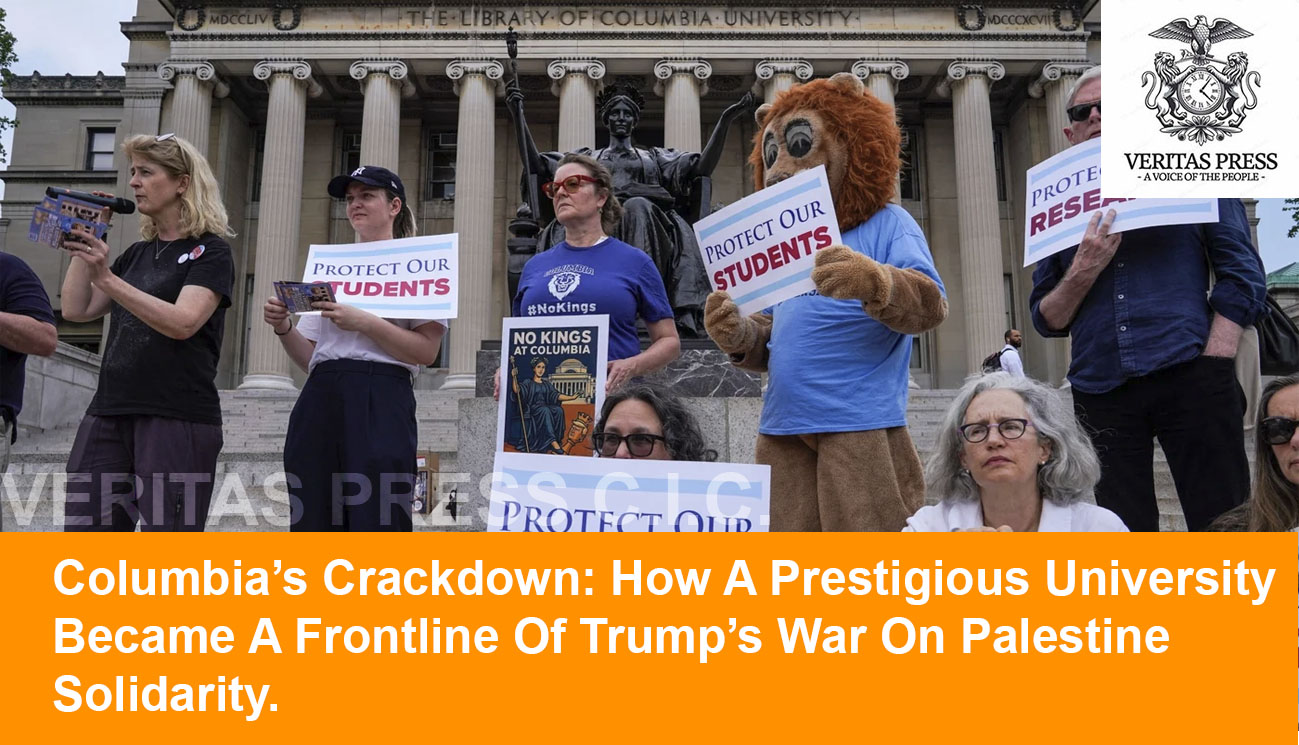Press Release: Veritas Press C.I.C.
Author: Kamran Faqir
Article Date Published: 24 July 2025 at 13:47 GMT
Category: US | Politics | Columbia’s Crackdown
Source(s): Veritas Press C.I.C. | Multi News Agencies

Dozens of pro-Palestinian students suspended or expelled as Columbia enforces federal pressure to quash dissent.
NEW YORK — Columbia University, once a symbolic cradle of anti-war dissent during the Vietnam era, now finds itself at the centre of an unprecedented campaign to punish pro-Palestinian student activism, under direct pressure from the Trump administration.
In a sweeping move that legal experts, civil liberties groups, and students are calling “politically motivated repression,” Columbia has issued disciplinary sanctions, including expulsions, multi-year suspensions, and degree revocations, to nearly 80 students involved in pro-Palestine protests.
The disciplinary rulings follow months of protests against Israel’s military campaign in Gaza, widely condemned by human rights groups and UN officials as amounting to genocide, and amid the Trump administration’s aggressive clampdown on university dissent.
“This is not about enforcing campus policy, it’s about criminalising protest and sending a message that Palestine advocacy will not be tolerated,” said Baher Azmy, legal director at the Centre for Constitutional Rights (CCR), which has been monitoring university crackdowns nationwide.
From Protest To Purge:
The wave of expulsions stems from two major protests at Columbia: a May 7 occupation of Butler Library and the “Revolt for Rafah” encampment during alumni weekend in May 2024. Protesters had demanded the university divest from companies linked to Israel’s military, cut institutional ties with Israeli universities, and acknowledge its complicity in the Gaza war.
Students involved in the Butler Library protest say the event was a peaceful teach-in honouring Palestinian intellectual Basel al-Araj, who was killed by Israeli forces in 2017. Organisers renamed the library “Basel al-Araj Popular University” for the day and held discussions about resistance, genocide, and academic erasure.
But within hours, Columbia administrators called in the NYPD. Officers arrested 78 students, several of whom sustained serious injuries. According to Columbia University Apartheid Divest (CUAD), at least four students were hospitalised with concussions. One protester described the brutality:
“They choked me until I was fading in and out of consciousness,” said the student, who requested anonymity for fear of retaliation. “One officer tried to gouge my eyes while another slammed my head into the marble floor of the library.”
CUAD called the university’s use of force “an act of academic violence and political cowardice.”
Trump’s Federal Leverage:
The student crackdown coincides with a broader campaign by the Trump administration to use federal funding as a bludgeon to control university politics. After retaking office in January, Trump launched a series of executive actions targeting “left-wing extremism” on campuses, particularly over Palestine solidarity activism.
In March, the Department of Education froze $400 million in federal research funding to Columbia, citing its “failure to curb antisemitism” during Gaza solidarity protests. The move forced Columbia into backroom negotiations with federal officials, culminating in a list of concessions.
According to internal documents leaked to The Intercept, the university agreed to:
- Adopt the controversial IHRA definition of antisemitism, which equates anti-Zionism with antisemitism.
- Empower 36 campus police officers with expanded arrest powers.
- Prohibit protest masks on campus.
- Sever ties with pro-Palestinian student organisations, including CUAD.
“These are not just disciplinary measures, they’re political directives,” said Dr. Noura Erakat, a legal scholar at Rutgers University and expert in international human rights law. “The administration is effectively deputising university leaders to suppress lawful protest. It’s McCarthyism dressed up in donor influence and anti-terror rhetoric.”
Rewriting The Rules To Enforce Silence:
Columbia’s own students allege that university president Claire Shipman altered the disciplinary process to ensure maximum penalties.
“She dismantled the University Judicial Board (UJB), removing elected student representatives and sidelining faculty,” said Laila Noor, a Columbia law student and CUAD member. “This was a targeted purge, executed to please Washington and donors.”
The Columbia Spectator, the university’s student paper, confirmed that the UJB panel for the Butler protest consisted solely of administrators and professors handpicked by Shipman’s office.
In a statement, the university said that disciplinary decisions were based on “individual case findings and precedent.” But CUAD and civil rights groups argue that punishments handed down far exceed those for past sit-ins and library occupations unrelated to Palestine.
“This is a clear break from precedent,” said Ramya Krishnan, a staff attorney at the Knight First Amendment Institute. “It appears Columbia has weaponised its disciplinary system against a specific political movement.”
The Broader Target: International Students.
Perhaps the most chilling aspect of the crackdown is the targeting of international students, like Mahmoud Khalil, a 30-year-old Palestinian graduate of Columbia and a former protest leader.
Khalil was detained by ICE in April and held in a Louisiana detention centre for over a month under an obscure clause of the Immigration and Nationality Act of 1952. The Trump administration now seeks his deportation for alleged “unlawful political conduct”, a label rights groups say is meant to criminalise Palestine advocacy.
Khalil was released in June after mounting pressure from lawmakers and civil society groups. But the threat of removal still looms.
“They want to make an example out of us,” Khalil said during a July press conference in Washington, D.C., where he met with House progressives. “They want students, especially Arab, Black, and international students, to be too afraid to speak out.”
According to documents obtained by Politico, the administration has proposed barring student visas for individuals affiliated with “anti-American protests” a clause critics warn could be used to broadly target pro-Palestinian activism.
Academic Freedom Under Siege:
The Columbia case is being watched closely by faculty nationwide. Professors at over 40 U.S. universities have signed open letters denouncing the university’s actions as a violation of academic freedom.
“This sets a terrifying precedent,” said Professor Rashid Khalidi, the Edward Said Chair of Modern Arab Studies at Columbia. “If peaceful protest can be met with expulsion, arrest, or deportation, then the university is no longer a place of free inquiry.”
Even some Jewish groups on campus have expressed opposition. In a statement, Jewish Voice for Peace–Columbia said:
“The Trump administration has co-opted antisemitism for political gain. As Jewish students, we reject the conflation of Zionism with Judaism, and we stand with our classmates who are being punished for opposing genocide.”
Meanwhile, In Gaza:
The context driving these protests has only grown more dire. According to OCHA and Médecins Sans Frontières, more than 1,000 Palestinians have been killed while waiting for aid since March. The UN confirmed last week that at least 80 children have starved to death due to Israel’s blockade and systematic targeting of food convoys.
“Every university in Gaza has been destroyed,” said a student in their disciplinary hearing. “Hundreds of professors killed. Libraries turned to rubble. Our protest was not a disruption. It was an act of academic solidarity.”
“You Can’t Expel a Principle”
Despite the wave of sanctions, Colombia’s pro-Palestine movement remains undeterred.
In a recent CUAD dispatch, a student wrote:
“If this hearing was meant to isolate or shame, it has done the opposite. It has made us clearer: no sanction can expel principle. Basel al-Araj wrote: ‘Join them, and don’t betray the question.’ We have joined, and we will not betray the question.”
With legal challenges pending and federal funding still hanging in the balance, Columbia’s administration now faces growing scrutiny, not just over its handling of campus unrest, but over its complicity in a larger assault on free speech, civil liberties, and resistance to genocide.
“Columbia has chosen the wrong side of history,” said Professor Khalidi. “And it will be remembered for silencing its students while Gaza burned.”




























Leave a Reply